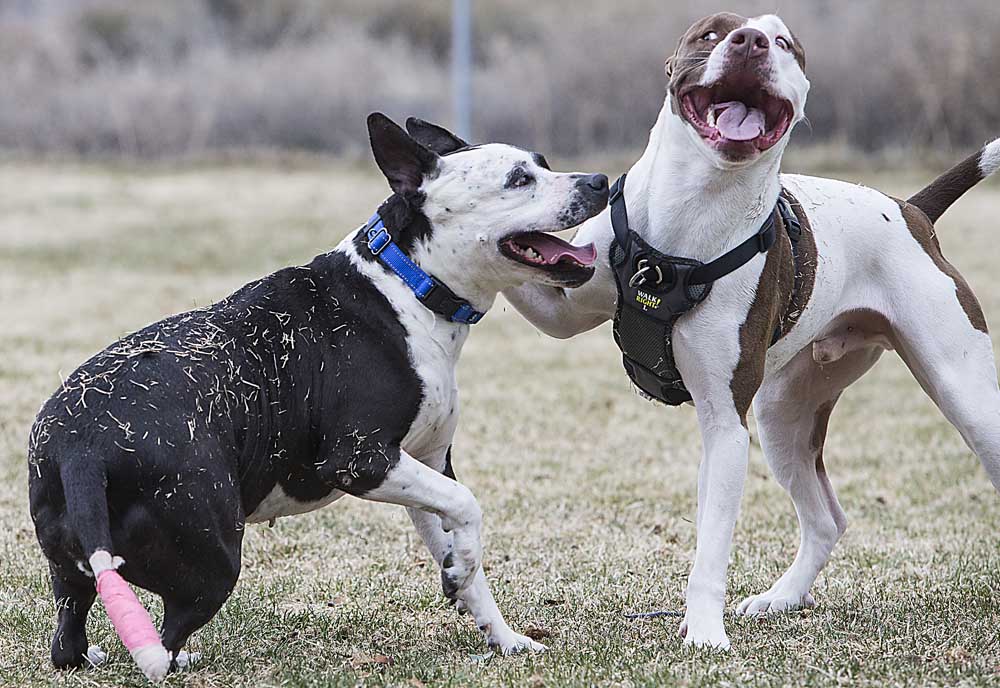Animal shelters brace for influx from coronavirus effects
Published 3:00 pm Saturday, March 28, 2020

- Kila, left, plays with the Selover family’s dog Hobbs during an adoption appointment at the Humane Society of Central Oregon.
As the coronavirus pandemic spreads, Central Oregon humane societies are trying to empty their kennels so they can reduce the amount of staff needed to care for their animals.
But shelter officials also fear those kennels could suddenly be full with animals whose owners were forced to get rid of them due to ongoing effects of COVID-19.
The area’s shelters are still open through the pandemic but are only accepting appointment-only adoptions. Between adoptions and foster homes, the shelters want to make room in case they get an influx of animals. Shelters worry the virus is creating a financial crisis that could lead to more people turning in their pets or letting them become strays.
“We are trying to be nimble and forward-thinking to the near future,” said Lynne Ouchida, community outreach manager at the Humane Society of Central Oregon.
“We will try to keep the adoption flowing through the shelter so we can meet the needs of the community through all of this.”
The Bend shelter has seen an increased interest in foster homes, with 30 new applications since March 1. That would add to the shelter’s 86 active foster homes for cats, dogs and small animals like rabbits and guinea pigs, Ouchida said.
Other shelters in Redmond, Prineville and Madras are seeing a similar rise in interested foster home families.
“The great thing is seeing how many people want to help and want to foster,” Ouchida said.
A silver lining to Gov. Kate Brown’s order to stay home to prevent the spread of the coronavirus means people have more time to train a newly adopted animal or open their homes to foster animals.
“It’s a phenomenal time to be adopting an animal because the whole family is home,” Ouchida said.
But the governor’s orders also include a moratorium on nonemergency pet surgeries such as spaying and neutering. The goal is to preserve medical equipment and masks for doctors and nurses battling the virus.
Not allowing animals to be spayed or neutered is putting the area’s shelters in a bind, said Jerilee Drynan, director of operations at Three Rivers Humane Society in Madras. The shelter cannot adopt an animal until it is spayed or neutered, she said.
The Madras shelter already has dogs in its 35 kennels, mostly strays that are not spayed or neutered.
“I’m backlogged with animals that could go into great homes but are not altered yet,” Drynan said.
Because most of the dogs are not ready for adoptions, some of the longer-term residents are getting a closer look.
“We don’t have a lot to offer that is ready to go,” Drynan said. “Luckly, some of our dogs that have been previously altered are getting some second looks.”
Drynan plans to contact the governor’s office and explain how the ban on spaying and neutering is affecting shelters. The Madras shelter cannot stop taking strays, since it has a legal agreement with law enforcement agencies in Jefferson County.
“What is happening has unintended consequences,’ Drynan said.
In Redmond, Brightside Animal Center changed its foster policy to accommodate more animals. The shelter previously only fostered puppies and kittens that didn’t have their vaccines yet to be around the other animals. Fostering was also available for older animals nearing the end of their lives.
Now, the shelter is trying to put as many animals in foster care as possible.
“Our whole idea of fostering has changed,” said Patricia Bowling, Brightside shelter manager.
Since March 21, when the Redmond shelter put out a request for foster homes, about 20 new families applied to foster dogs and about 10 applied to foster cats.
Bowling hopes some of these foster families become permanent homes for the animals.
“We have been amazed by the people who have come in for fostering,” Bowling said. “We are hoping some of the families that have taken these animals will fall in love with them and go ahead and adopt them.”






